This article spotlights the expansion of strategic space that will result from the introduction of A400M and MRTT aircraft. French force and power projection can now be envisaged using a more dynamic approach to the networking of our support bases.
A Case for the Dynamic Management of French Overseas Bases
The geostrategic and geopolitical developments that are foreseeable in the short, medium and long term will not fundamentally affect France’s continuing role as a major influence in world affairs. This influence is the result of a mix of factors: a culture of international responsibility; an independent nuclear deterrent; her place in a globalized economy; multilateralism underpinned by a strong diplomatic network; a worldwide network of friendships and alliances; and the wide geographic spread of her overseas departments, administrations and economic zones, among others. This discussion paper concentrates more on the question of the depth and intensity with which France should fulfil her role of influence in the world, rather than the questioning of any worldwide ambition.
All that said, the evolution of many factors, whether they be economic, diplomatic, political, societal, technological or military, obliges us to define the innovative options which will allow France to fulfil her worldwide role and concentrate on her new strategy of access. At the same time these options must be realistic with regard the resources available.
New technical factors
In this context, our thinking must lean towards how diversification of certain elements might increase force mobility. By their very nature they must integrate the increased reach which we can now give to our interventions (which is a function of our projection capability), but equally on our forces in theatre so as easily to increase their range of action. This thinking is made even more urgent by the impending arrival of new equipment such as the A400M from 2013 onwards, and then the MRTT (Multi Role Tanker Transport) in 2017: these will bring step improvements in speed, range and carrying capacity.
Not only will their new capabilities facilitate direct interventions mounted from France itself, but they will also create the major political advantage of reinforcing the visibility and flexibility of independent French action: potentially, France will instantly have a significant worldwide presence. The changes will be revolutionary, in the true sense of the term. Currently three days are needed for a Transall to reach La Réunion with 7 tons of freight; an A400M can do this trip with three times the load in only fourteen hours. It will also be possible to do a return journey from France to Djibouti in a day. Similarly, when France partnered Australia in Operation Santal in West Timor in 1999, the speed of our intervention and the volume of materiel initially deployed were constrained by the range and capacity of our C130s, which needed four days to reach Darwin. In an identical scenario, from now on France will be able to deploy two to three times more materiel in less than 24 hours.
Extension of our strategic space
With this new capability of moving more, further and quicker, we are witnessing a real expansion of our strategic space, leading to an increase in our diplomatic influence. It will create a physical, rather than a virtual, link between the French homeland and its overseas possessions on the other side of the world in an even more dynamic way. In this way, and as a complement to the French maritime presence, the Air Force will be able to add its quick reaction capability directly from Paris itself. It will reinforce our credibility, and above all it will further underpin France’s presence in the many regional forums in which the country partakes as a function of its economic exclusion zones, particularly in the Pacific and Indian Oceans. Defence cooperation, such as the FRANZ Agreement with Australia and New Zealand, will gain in substance.
Finally, Alain Boinet and Benoît Miribel remind us of humanitarian action in crisis and post-crisis situations: ‘The armed forces have an important role to play in disaster situations with their transport and logistic capabilities. They can also help effectively with the evacuation of French and other countries’ citizens in emergencies, such as from Lebanon in the summer of 2007. Furthermore, in sudden medical emergencies such as that in Kashmir in the autumn of 2005, field hospitals can deal with casualties and save lives’. (1)These new characteristics will give us an increased intervention capability, which will further give backing to French influence and the country’s role as a permanent and responsible player on the world scene.
The case for the dynamic management of French bases overseas
The added boost that this will give to French foreign policy will only be seen if the nature and use of these new resources are looked at in a way which takes advantage of their intrinsic qualities, and which can also be based on a new and dynamic ‘hub and spoke’ arrangement to give the country the ability to intervene and exert influence from overseas bases at minimum cost.
It is obvious that the conditions necessary for rapid intervention include, among others, the existence of a solid overarching infrastructure which adds further, complementary solutions to our traditional overseas bases, thus increasing our guarantee of easy access. Our forces currently pre-positioned overseas, whilst already contributing significantly to international security and stability, do not fully fit in to these future requirements. We need to develop further the relevance of this network in a win-win way by establishing individual partnerships whose objective must be to allow deployments of military or civil assistance in very short reaction times from staging points which can be rapidly brought up to fighting standard. This arrangement, which must offer a variety of solutions, has to begin with the negotiation of diplomatic agreements designed to accelerate the deployment of French and/or allied resources. This non-constraining approach can be adapted easily to any strategic development. It must be complemented by the pre-positioning of materiel and the establishment of carefully positioned, permanent staging points of varying size.
In this respect, France has the good fortune to hold many trump cards which will allow the country to meet this requirement at minimum cost.
She has close relationships with a number of states close to areas of strategic interest, whose potential can be further exploited. Countries such as Singapore (whose pilot training takes place in Cazaux), and India are partners upon whose services we can call increasingly. Beyond the fruitful operational cooperation with these countries, the local programmes of joint exercises must help to prepare and perfect procedures for establishing these potential bases should the need arise, even to the extent of to pre-positioning materiel in them.
The benefits of allied networks
Our British and American allies, both powers with global interests, are supported by networks which are complementary to our own. We could possibly take advantage of these either by using our bases as bargaining counters, or by contributing to their running costs. The British and, especially, American bases open doors to the routes to South East Asia and the Pacific. Use of them would allow us to develop, and even facilitate, our zone of action towards new areas of interest. As far as our traditional French operating zones are concerned, they would offer case-by-case projection facilities (for both deployments and support activities), and allow us to consider new areas of cooperation, notably in the field of operational preparation.
The same applies to our partners in the European Air Transport Centre and the Multimodal Coordination Centre for European Transport, who share our common problems of force projection. The joint development of a worldwide network must be a key area of work which will among other things contribute greatly to cementing the construction of European defence. There is a real strategy to develop here, dealing with both equipment and deployment, one which should result in economy of resources and concentration of effort.
Furthermore, the airlines which fly Airbus (and that includes our A400 M and MRTT) offer potential worthy of exploitation. On the basis of obvious common interests, partnerships could be built to contribute to the creation of a network based around ‘hubs’, to broaden our worldwide coverage. They would also allow us to share our spare parts, technical support and staging points, or even assistance to, and reinforcement of, our own aircrews.
Raising France’s profile
Finally, the development and maintenance of such a secured network, encouraged by regular personnel exchanges or joint exercises with the host nations, would contribute to France’s reputation and international influence. It cannot be denied that this will require a major diplomatic effort to establish cooperation which will be sufficiently robust in the longer term.
To conclude, the new systems which are about to enter service will lead to an expansion of our strategic sphere of influence. They will give us a virtually instant response capability and demand a dynamic approach to a renovated network of overseas bases. When considered in parallel with the complementary networks of our British and American allies, a new dimension will be added to France’s capability for action, rendering it even more visible, more flexible and more all-encompassing. ♦
(1) Report made in March 2010 to Bernard Kouchner, the then Foreign Minister.






